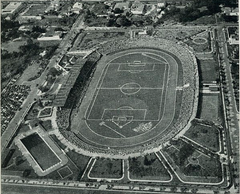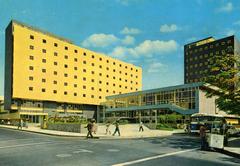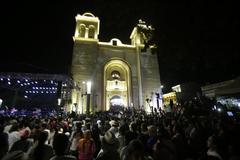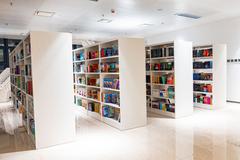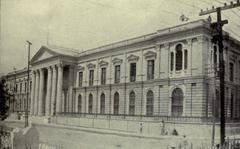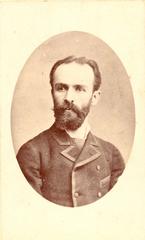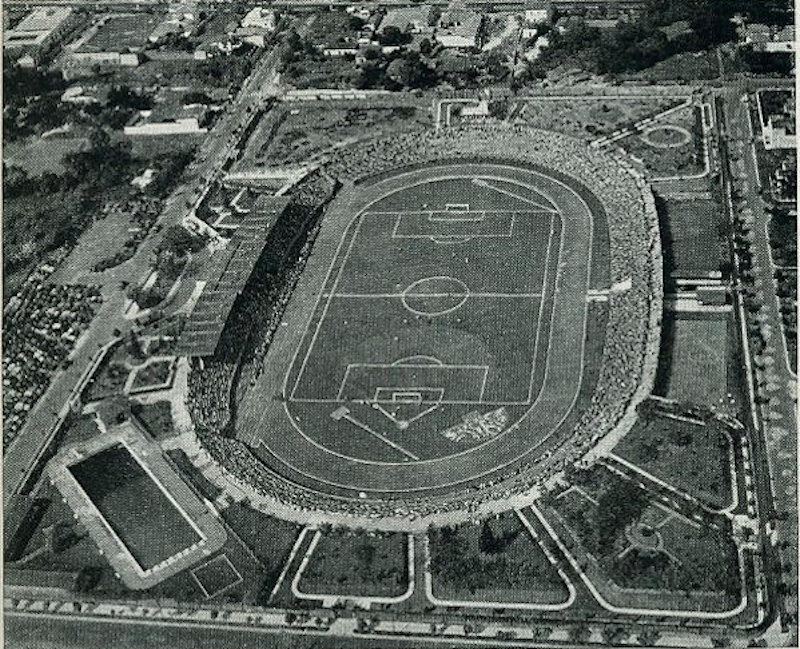
Estadio Jorge “El Mágico” González: Visiting Hours, Tickets, and San Salvador Historical Sites Guide
Date: 15/06/2025
Introduction
Estadio Jorge “El Mágico” González is a landmark of San Salvador, celebrated not only as a premier sports venue but also as a cultural icon and historic site. Located in the vibrant Colonia Flor Blanca neighborhood, the stadium stands as a testament to El Salvador’s sporting achievements and national pride. Whether you’re a sports fan, a cultural enthusiast, or a tourist exploring the city, a visit to the stadium offers an immersive experience into the heart of Salvadoran heritage.
This comprehensive guide covers the stadium’s history, architectural features, visitor information—including hours, ticketing, accessibility, and transport—plus tips for exploring nearby historical sites. For the latest updates, consult trusted resources such as Diario El Salvador, El Salvador.com, and Trip.com.
Table of Contents
- Historical Overview
- Cultural and Sporting Significance
- Visitor Information
- Notable Events and Legacy
- Visitor Tips
- Frequently Asked Questions (FAQ)
- Conclusion
- References
Historical Overview
Origins and Construction
The stadium was inaugurated in 1935 as Estadio Nacional Flor Blanca, designed to host the III Juegos Centroamericanos y del Caribe. The construction, initiated under President Maximiliano Hernández Martínez in 1932, marked a major milestone for Salvadoran sports infrastructure, symbolizing modernity and national pride (Wikipedia; Diario El Salvador). Its location in Colonia Flor Blanca, now a central urban district, made it a focal point for major sporting and cultural events.
Renovations and Modernization
Over the decades, the stadium has undergone significant transformations:
- 2002 Renovation: To host the Central American and Caribbean Games, the stadium was expanded and modernized, increasing capacity to approximately 30,000–35,000 and installing a world-class tartan athletics track (Svel Salvador).
- 2006 Renaming: The stadium was renamed to honor Jorge “El Mágico” González, the nation’s most esteemed footballer, reflecting his impact on Salvadoran sport and identity (Transivar).
- 2022–2023 Modernization: A $22 million investment ahead of the 2023 Central American and Caribbean Games enhanced over 65% of the seating, introduced a new natural grass pitch, upgraded the athletics track, expanded VIP zones, and established a dedicated museum (Diario El Salvador; ColosseoEAS). Today, the stadium meets international standards for multi-sport events.
Cultural and Sporting Significance
Estadio Jorge “El Mágico” González is a symbol of unity and national pride, regularly hosting finals for the Liga Mayor de Fútbol (LMF), World Cup qualifiers, and major international tournaments. It is the home ground for the national team, “La Selecta,” and has welcomed legendary football clubs and world-class artists for concerts and festivals (El Salvador.com; TCS Ahora). The stadium is also a venue for community events, athletics, and cultural celebrations, reinforcing its deep connection with the Salvadoran public.
Visitor Information
Visiting Hours
- General Hours: Tuesday to Sunday, 9:00 AM to 6:00 PM. Closed on Mondays and major public holidays.
- Event Days: Gates open 1–2 hours before the scheduled event.
- Museum: Same as general hours.
Hours may vary on event days; always check the official event calendar on Trip.com or with stadium management.
Ticket Prices and Purchase Options
- Museum Entry: $3 USD (adults), $1.50 USD (children/seniors).
- Football Matches/Concerts: $5–$15 USD (general admission) to $50+ USD (premium/international events), depending on the event.
- Where to Buy: Tickets are available online through official platforms, at the stadium box office, or select authorized outlets. For high-profile events, purchase in advance due to high demand.
Accessibility
- Wheelchair-accessible entrances, ramps, elevators, and seating exist throughout the stadium.
- Accessible restrooms and clear, multilingual signage ensure inclusivity.
- Public transport, taxis, and ample on-site parking are available, with designated spaces for disabled visitors (CABEI News).
Getting There
- By Taxi/Rideshare: 10–20 minutes from downtown; $3–$7 USD.
- By Bus: Routes 30-B, 52; fares $0.25–$0.35 USD.
- By Car: On-site and nearby parking ($2–$5 USD on event days). Arrive early to secure a space.
- On Foot: Easily walkable from Flor Blanca and Escalón neighborhoods.
Guided Tours and Museum
- Guided Tours: Available weekends and by appointment, offering behind-the-scenes access to locker rooms, press areas, and the museum.
- Museum: Features memorabilia, interactive exhibits, a mini-cinema, and displays honoring Jorge “El Mágico” González and Salvadoran sports history.
Facilities and Amenities
- Seating: Capacity for 35,000+ spectators, with covered and VIP sections.
- Restrooms: Modern, with accessible options.
- Food/Beverage: Concessions offering local cuisine (pupusas, tamales), snacks, and drinks.
- Merchandise: Jerseys, scarves, souvenirs, and exclusive memorabilia.
- First Aid/Security: Medical teams and security staff present at all events.
- Family-Friendly: Child-friendly amenities and designated family sections.
Nearby Attractions and Suggested Itineraries
- Museo de Arte de El Salvador: Salvadoran and Latin American art, less than 2 km away.
- Parque Cuscatlán: Urban park for relaxation and recreation.
- Teatro Presidente: Historic theater with cultural performances.
- Dining: Pupuserías, cafés, and international restaurants within walking distance.
- Accommodation: Hotels and guesthouses in Flor Blanca and Escalón, from budget to luxury (Trip.com accommodation).
Notable Events and Legacy
- 1935: Hosted the III Juegos Centroamericanos y del Caribe (Wikipedia).
- 2002 & 2023: Central American and Caribbean Games, prompting major renovations.
- 2024: Site of the Liga Mayor de Fútbol Apertura final, marking the return of domestic football’s most important match (El Salvador.com).
- Concerts: International artists including Shakira and Luis Miguel have performed here (TCS Ahora).
The stadium stands as a living tribute to “El Mágico” González’s legacy, inspiring generations of Salvadoran athletes and fans.
Visitor Tips
- Plan Ahead: Confirm visiting hours and event schedules online.
- Buy Tickets Early: Especially for finals or concerts.
- Arrive Early: Beat traffic and explore the museum or shops.
- Public Transport Recommended: On major event days, to avoid parking congestion.
- Dress Comfortably: San Salvador’s climate is tropical; bring rain gear in wet season (May–October).
- Sample Local Cuisine: Try pupusas and other Salvadoran dishes at stadium vendors.
- Respect Security Protocols: Prohibited items include large bags, umbrellas, outside food/drinks, and professional cameras.
Frequently Asked Questions (FAQ)
Q: What are the stadium’s visiting hours?
A: Tuesday–Sunday, 9:00 AM–6:00 PM; closed Mondays. Hours may extend on event days.
Q: How do I buy tickets?
A: Purchase online via official platforms or at the stadium box office.
Q: Is the stadium accessible?
A: Yes, with ramps, elevators, accessible seating, and restrooms.
Q: Are guided tours available?
A: Yes, on weekends and by appointment.
Q: Can I take photos?
A: Photography is allowed except in restricted exhibit areas.
Q: What attractions are nearby?
A: Museo de Arte de El Salvador, Parque Cuscatlán, Teatro Presidente, plus dining and shopping options.
Conclusion
Estadio Jorge “El Mágico” González is more than a sports venue—it is a beacon of Salvadoran culture, resilience, and unity. Its blend of historic significance, modern amenities, and lively atmosphere makes it a must-visit for anyone in San Salvador. Plan your visit by checking current schedules and ticket availability, and enrich your trip with a visit to the museum and nearby cultural attractions. For the latest updates and exclusive content, download the Audiala app and follow us on social media.
